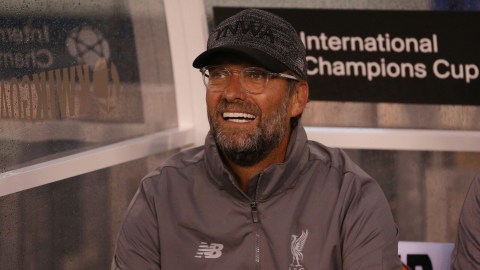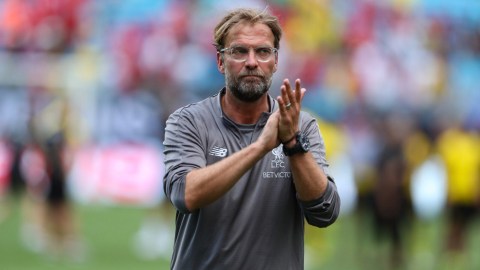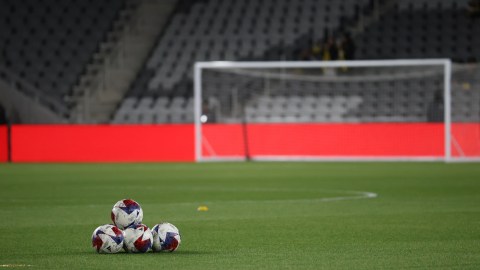 Many think Paolo Di Canio‘s appointment as Sunderland manager is one of the biggest gambles in the Premier League’s recent history, but they do so for the wrong reasons.
Many think Paolo Di Canio‘s appointment as Sunderland manager is one of the biggest gambles in the Premier League’s recent history, but they do so for the wrong reasons.
Sunderland fired Martin O’Neil on Saturday, after a home loss to Manchester United left it sitting one point above the relegation zone with seven games to play. Chairman Ellis Short replaced O’Neil with Di Canio, hoping the Italian’s arrival will lift a demoralized squad which has only earned three of a possible 24 points over its last eight games.
At stake is a place in next season’s Premier League and the extra £30 million ($45.3 million) in cash that will flow into the club’s accounts under the terms of the league’s new television deal.
Di Canio’s political views have already turned the first days of his tenure at the Stadium of Light into an unending firestorm. His alleged fascist leanings run counter to the socialist roots of the club and city, but the political controversy won’t sink the union between club and manager.
While many Sunderland fans have misgivings about Di Canio’s politics, the storm will almost certainly lose strength in the coming days. Di Canio and Sunderland have already issued a statement denying the manager’s alleged views. The next big story or narrative twist will occupy the attention of most media outlets (it always does), leaving the Di Canio, the players and staff to get on with their work.
Clubs often see a “bounce” in results after hiring a new manager, as liberated players are often doubly determined to prove their worth to the new man in charge. Sunderland doesn’t need much of a bounce to survive. Victory in either of the next two games (away to Chelsea and Newcastle) will give Di Canio instant credibility and momentum with the players and fans. Games against fellow strugglers Aston Villa, Stoke City and Southampton are also part of Sunderland’s run-in. Winning three of its final seven games would give the club 40 points, which is a reasonable benchmark for safety. One could argue that replacing O’Neil with anyone (of a decent reputation) would have the desired effect. Di Canio will be the main beneficiary of this fortunate timing.
While Di Canio is a safe bet in the short-term to steer the club clear of relegation, his methods and personality could be his undoing over the long-term. His only previous managerial experience was a largely successful 21-month stint in charge of Swindon Town, where he was, by all accounts, a strict disciplinarian who exercised total control over his players’ lives. Those ways worked wonders with a collection of unheralded youngsters and journeymen, but there’s no certainty that the richer, more cosmopolitan group he inherits from O’Neil will accept such an approach after the fog of war against relegation lifts.
Ever enthusiastic, energetic and full of self-belief, Di Canio vows to bring his controlling management style to the top flight, according to Sky Sports.
“You have to know how to manage your players,” he said. “It is obvious you have different egos in the Premier League, but you have to have strict rules, discipline, and work hard on the field during the week otherwise the product you deliver on Saturday is not good. That won’t change. It’s not just Paolo Di Canio’s opinion, all managers around the world think the same.
“If everybody interprets the game wrong because they do not train properly during the week or because there is no discipline you have an anarchists’ team, and if there is anarchy maybe the players try to do the right thing but doesn’t work in the way it should.
“Yesterday was the first training session and it was a shock for them. But they showed fantastic commitment and we are going to change a bit our philosophy in the way we approach our training sessions, because if you do not prepare yourself the best in your training session you can’t do a good job in a Saturday or Sunday game.”
The real gamble isn’t that Di Canio’s politics will sink his tenure before it gets off the ground. Nor is it that his notoriously passionate and confrontational style won’t go over well with some Sunderland players and relegation will follow. The real risk lies in the long-term partnership between manager and club.
Short took over the club in 2009, and Sunderland hasn’t consolidated its position in the Premier League since then. It finished 13th, 10th and 13th in the seasons preceding this troubled one. It is on its fourth manager under Short (only O’Neil and Steve Bruce were full-time hires), and Di Canio is by far the least experienced and most mercurial of the bunch.
It’s likely that Di Canio’s reign will begin with great promise, but personality clashes with those above and below him will ultimately undermine his efforts. The chances of a man who, in the words of his previous employer, manages “by hand grenade” seeing out the length of his two-and-a-half-year contract or having enough success to warrant an extension are slim. Therein lies the real danger for Sunderland. After all the early controversy and a relegation fight or two, it might find itself in the position of looking for a manager who can turn it into a Premier League mainstay and challenger for a place in Europe in two years’ time. If that turns out to be the case in 2015, it won’t speak well for the eight seasons which followed Sunderland’s most recent promotion to the top flight (in 2007-08). Instability rarely serves a soccer club well. Hiring an explosive type like Di Canio only welcomes more of it to Sunderland over the long term.
Have a question for Marcus Kwesi O’Mard? Send it to him via Twitter at @NESNsoccer or @mkomard, his Facebook page or NESN Soccer’s Facebook page or send it here. He will pick a few questions to answer every week for his mailbag.



